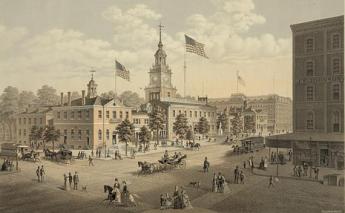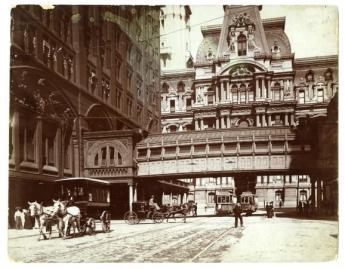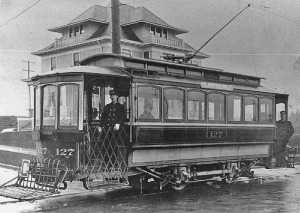Related Topics
Downtown
A discussion about downtown area in Philadelphia and connections from today with its historical past.

Philadelphia Economics
economics
Nature Preservation
Nature preservation and nature destruction are different parts of an eternal process.
Dislocations: Financial and Fundamental
The crash of 2007 was more than a bank panic. Thirty years of excessive borrowing had reached a point where something was certain to topple it. Alan Greenspan deplored "irrational exuberance" in 1996, but only in 2007 did everybody try to get out the door at the same time. The crash announced the switch to deleveraging, it did not cause it.
Railroad Town
 It's generally agreed, railroads failed to adjust their fixed capacity to changing demands. It's less certain Philadelphia was pulled down by that collapsing rail system.
It's generally agreed, railroads failed to adjust their fixed capacity to changing demands. It's less certain Philadelphia was pulled down by that collapsing rail system.
Cultural
Culture and Traditions (2)
Right Angle Club 2010
2010 is coming to a close, a lame-duck session is upon us, and probably after that will come two years of gridlock. But the Philadelphia Men's Club called the Right Angle, keeps right on talking about the current scene. A few of these current contents relate to speeches given elsewhere.
Urban Transportation
Stuart Taylor, who spent twenty years working for the Pennsylvania Railroad in the company of our member Bill Brady, recently gave the Right Angle Club his observations about urban transportation, which grew out of his second career as a consultant. As he describes the evolution from the horse-drawn omnibus carriage to the horse-drawn trolleycar, to the steam-driven trolley, to the electric trolley, to the underground subway, certain parallel historic movements occurred to at least one member of this audience.

|
| Horse-Drawn Trolley Car |
In the first place, mass transportation is only of value when cities grow to a large enough size to justify the expense. And the growth of cities in the 19th Century was propelled by the Industrial Revolution attracting mass immigration into urban centers. Whether the Industrial Revolution is over or not, is a topic which could be debated, but it was the gasoline engine which made buses and autos attractive, and the decaying slums made cities sufficiently unattractive to cause the flight to the suburbs in the 1920s and 1930s, heavily resumed after World War II in the 1950s. During the heyday of city growth, the evolution of mass transit seemed to be driven by technology, and that in turn attracted private ownership. When the gasoline engine and/or the decline of the Industrial Revolution made the Flight to the Suburbs possible, it made urban transportation unprofitable and hence unattractive to private business owners. Somewhere just before or after the 1929 Crash, the changing situation made it more attractive to live and/or work in the suburbs. A sign of this change in dynamics was the total disappearance of private ownership of public transportation and its supporting infrastructure, and replacement by public ownership and public tax subsidy. As local politics began to reflect this change, Urban politics somehow became dominated by Democrats, and Suburban politics became dominated by Republicans; so the enthusiasm for mass transit has waxed and waned as the political domination of federal subsidies has shifted between the parties. That's probably only an outward sign, however. The real issue is that urban transportation now has to be subsidized since its base has shrunk to the point where people like Widener and Elkins invest in other things. And do so from their homes in exurbia, where the neighbors could care less about subways, let alone pay taxes to subsidize them. And until the city gets control of its crime, public schools, and taxes, it's hard to see what will attract them back in town.

|
| Electric Trolley |
That's perhaps an overly censorious view, coming from a resident of the suburbs. A more economic view of things would be that the construction of underground subways now costs about a billion dollars a mile. Very few cities and no private entrepreneurs can justify costs of that magnitude since the potential ridership cannot afford the costs per ride which are implicit in that capital expenditure. Until the cities can manage to entice the suburbanites back into town, those people will solve their air pollution problems by avoiding the cities. Living to the windward seems much more plausible to them. China is just beginning this process, but they have the advantage of building the subways first, then the surrounding skyscrapers, and thus greatly reducing the costs of avoiding underground sewer systems, etc. If you could call it that, the Europeans had the advantage of massive war destruction, along with much more expensive farmland to inhibit suburbanization. None of this is an argument that we shouldn't build subways, or clean up the atmosphere. It's just a warning of the daunting construction costs and staunch political opposition to mass transit. Not to mention featherbedding, over-hiring, massive hidden benefits costs, and other features which seem to be inherent in union activity, at least of the historical variety.
A member of the Right Angle audience asked the speaker what he thought of the proposed Market Street light rail line. Insane, was the answer. No visible ridership. And that seemed to summarize the present debate.
Except that it really shouldn't frame the argument for Philadelphia. Philadelphia doesn't need a mass transit network, it already has a mass transit network. Much of it is growing obsolete, but the land costs and local opposition to change are greatly diminished when the network is already there. If any city can do it, Philadelphia can. The technology will surely evolve enough for our purposes if the money is there, and the money will be there if people return to using the city. What Philadelphia needs is a return of business headquarters and other sources of employment, bringing the ridership and the public demand along with it. And for that, what is essentially needed is for government to address our problems of uncontrolled crime, inferior public schools and maladministered taxes.
Originally published: Friday, March 05, 2010; most-recently modified: Monday, June 03, 2019